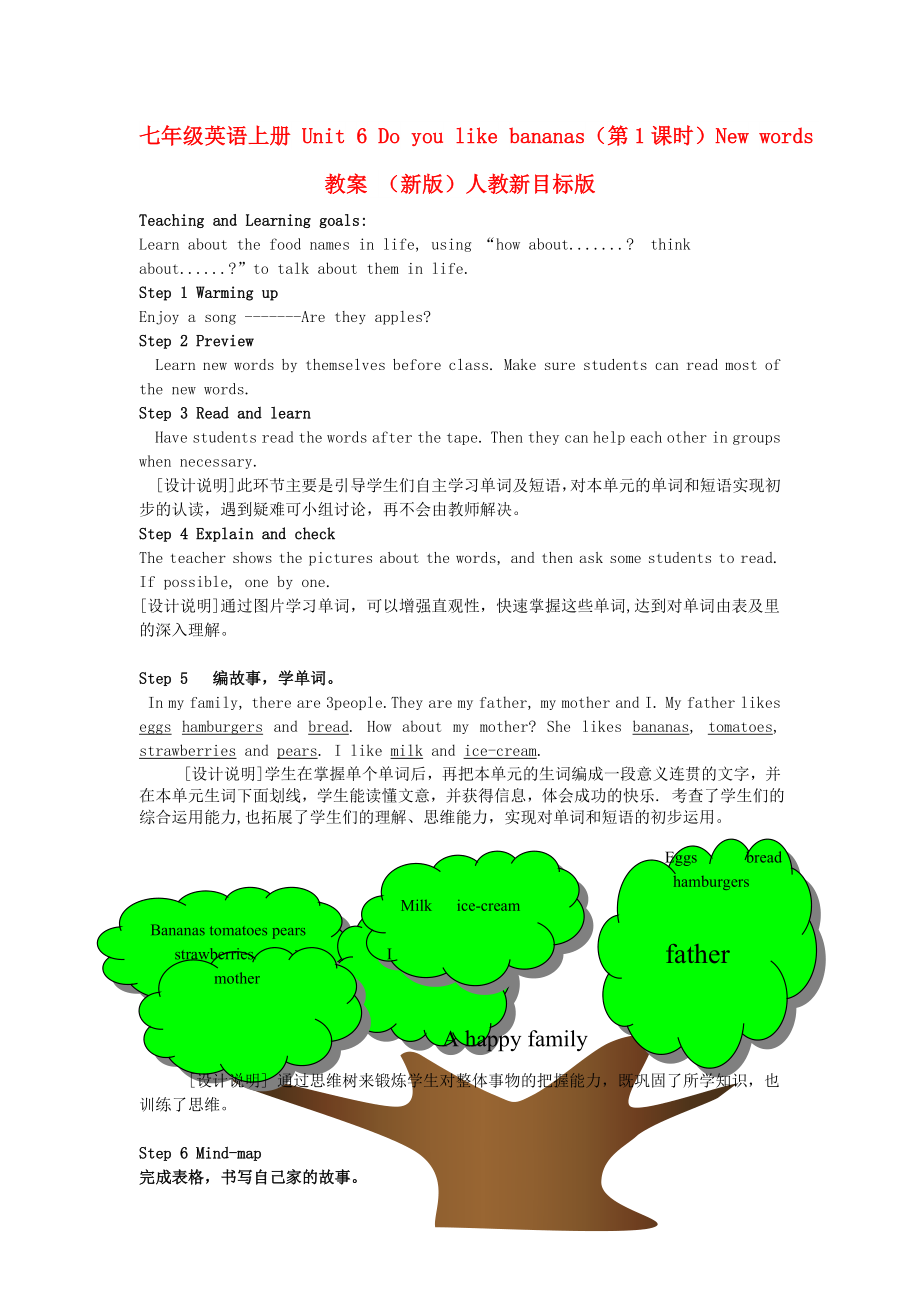《七年級(jí)英語(yǔ)上冊(cè) Unit 6 Do you like bananas(第1課時(shí))New words教案 (新版)人教新目標(biāo)版》由會(huì)員分享,可在線閱讀���,更多相關(guān)《七年級(jí)英語(yǔ)上冊(cè) Unit 6 Do you like bananas(第1課時(shí))New words教案 (新版)人教新目標(biāo)版(3頁(yè)珍藏版)》請(qǐng)?jiān)谘b配圖網(wǎng)上搜索��。
1��、七年級(jí)英語(yǔ)上冊(cè) Unit 6 Do you like bananas(第1課時(shí))New words教案 (新版)人教新目標(biāo)版
Teaching and Learning goals:
Learn about the food names in life, using “how about.......? think about......?”to talk about them in life.
Step 1 Warming up
Enjoy a song -------Are they apples?
Step 2 Preview
Learn new words by th
2��、emselves before class. Make sure students can read most of the new words.
Step 3 Read and learn
Have students read the words after the tape. Then they can help each other in groups when necessary.
[設(shè)計(jì)說(shuō)明]此環(huán)節(jié)主要是引導(dǎo)學(xué)生們自主學(xué)習(xí)單詞及短語(yǔ)���,對(duì)本單元的單詞和短語(yǔ)實(shí)現(xiàn)初步的認(rèn)讀,遇到疑難可小組討論�����,再不會(huì)由教師解決�。
Step 4 Explain and check
The tea
3、cher shows the pictures about the words, and then ask some students to read. If possible, one by one.
[設(shè)計(jì)說(shuō)明]通過(guò)圖片學(xué)習(xí)單詞����,可以增強(qiáng)直觀性,快速掌握這些單詞,達(dá)到對(duì)單詞由表及里的深入理解�。
Step 5 編故事,學(xué)單詞�。
In my family, there are 3people.They are my father, my mother and I. My father likes eggs hamburgers and bread. How about my
4、mother? She likes bananas, tomatoes, strawberries and pears. I like milk and ice-cream.
[設(shè)計(jì)說(shuō)明]學(xué)生在掌握單個(gè)單詞后���,再把本單元的生詞編成一段 意義連貫的文字��,并在本單元生詞下面劃線����,學(xué)生能讀懂文意��,并獲得信息�,體會(huì)成功的快樂(lè). 考查了學(xué)生們的綜合運(yùn)用能力,也拓展了學(xué)生們的理解、思維能力��,實(shí)現(xiàn)對(duì)單詞和短語(yǔ)的初步運(yùn)用�����。
Eggs bread
hamburgers
Milk ice-cream
Bananas tomatoes pears
strawberries
5�、father
I
mother
A happy family
[設(shè)計(jì)說(shuō)明] 通過(guò)思維樹來(lái)鍛煉學(xué)生對(duì)整體事物的把握能力,既鞏固了所學(xué)知識(shí)���,也訓(xùn)練了思維����。
Step 6 Mind-map
完成表格,書寫自己家的故事�����。
vegetables
fruits
food
father
mother
I
[設(shè)計(jì)說(shuō)明]此環(huán)節(jié)是對(duì)以上環(huán)節(jié)的總結(jié)性訓(xùn)練��,是一堂課的升華��,通過(guò)學(xué)情了解學(xué)生們的掌握情況����,也有利于教師及時(shí)進(jìn)行調(diào)整。
Step 7 Dictation and check.
Have students
6�����、write the words from the memory without their books. And then check each other.
Step 8 The end-of class test
用所給單詞的適當(dāng)形式填空��。
1�,There are four ______ (tomato) on the table.
2, My sister _______ (like) fruit.
3, She __________ (not like) bananas.
4, Where _________(be) the vegetables?
5, Jef
7、f likes ___________ (strawberry).
Step9 Homework
Talk about your family’s favorite food and write a short passage.
My name is …, I like …, but I don’t like …
My father likes …, but he doesn’t like …
My mother likes …, but she doesn’t like …
Answers:
Step8: 1, tomatoes 2, likes 3,doesn’t l
8�、ike 4,are 5,strawberries
教學(xué)反思:
亮點(diǎn):
此節(jié)詞匯的課堂設(shè)計(jì)基本涵蓋了本單元的重點(diǎn)詞匯�����,在引領(lǐng)學(xué)生們記憶的過(guò)程中注重了不同層次的學(xué)生的識(shí)記與理解;通過(guò)各種形式的教學(xué)既加深了單詞的識(shí)記�����,又理解了部分單詞的大致用法����,Step 6 Mind-map環(huán)節(jié)能反映學(xué)生們的學(xué)習(xí)效果,有利于教師合理調(diào)整���;當(dāng)堂檢測(cè)能講練結(jié)合����、及時(shí)鞏固�����。故事編寫讓學(xué)生在故事中對(duì)單詞有了大致理解��。培養(yǎng)了學(xué)生自學(xué)能力和小組合作能力�����。
不足之處:
本單元詞匯沒(méi)能全部涉及,有很多用法并沒(méi)有全面展示�,個(gè)別內(nèi)容難度稍大。
使用建議:
教師要充分帶領(lǐng)學(xué)生們進(jìn)行自主學(xué)習(xí)�����,重點(diǎn)要學(xué)習(xí)“四會(huì)”單詞及核心短語(yǔ)�����;學(xué)會(huì)它們的用法�����,同時(shí)配合多媒體課件����,效果才能更好一些。
 七年級(jí)英語(yǔ)上冊(cè) Unit 6 Do you like bananas(第1課時(shí))New words教案 (新版)人教新目標(biāo)版
七年級(jí)英語(yǔ)上冊(cè) Unit 6 Do you like bananas(第1課時(shí))New words教案 (新版)人教新目標(biāo)版

